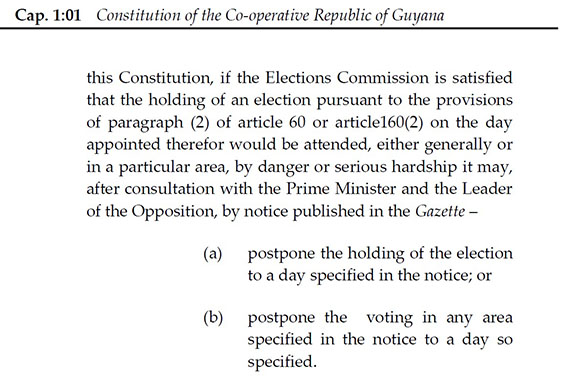Former Auditor General Anand Goolsarran maintains that it is not difficult to repurpose the funds earmarked for national house-to-house registration in order to hold general elections, since as a constitutional agency the Guyana Elections Commission (GECOM) has wide discretion in the use of its budgetary allocation.
GECOM, which has been allocated $3.36 billion for house-to-house registration this year, decided on Tuesday to inform President David Granger that it needs funding for the holding of general elections.
The decision was informed by advice from the Ministry of Finance, which indicated to GECOM that it must return to the National Assembly for permission to alter its budgetary allocations in order to finance the holding of general and regional elections. However, the opposition PPP/C has challenged the advice.
Elections are due following the passage of a no-confidence motion against the government on December 21st. A High Court ruling upheld the passage of the motion, but the case is being appealed.
Based on the advice from the ministry and by majority decisions, GECOM on Tuesday also determined that it will advise President Granger that the 90-day constitutional deadline for general elections cannot be met and it will continue with its approved work plan for the year, including a national house-to-house registration process.
In a comment to Stabroek News, Goolsarran observed that Article 162(2) of the Constitution provides that if GECOM is satisfied that holding elections on the appointed day is likely to pose a danger or create serious hardship, it may, after consultations with the Prime Minister and the Opposition Leader, postpone the holding of the elections to a date specified in a notice in the Gazette. “The Constitution does not mention the President, and it is not clear whether the Prime Minister and the Opposition Leader were consulted,” he noted.
He also pointed out that Article 222A of the Constitution states that in order to secure the independence of a constitutional agency, the expenditure of that agency shall be a direct charge on the Consolidated Fund, determined as a lump sum by way of an annual subvention. The subvention is to be managed in such a manner as the agency deems fit for the efficient discharge of its functions, subject only to conformity with the financial practices and procedures approved by the National Assembly, he said.
Goolsarran pointed out that Article 162(1) identifies two main functions of the Commission; namely, the registration of electors; and conducting elections as provided for by the Constitution or an Act of Parliament.
He said that a direct charge on the Consolidated Fund is an expenditure that is not voted on by the National Assembly and is not included in an Appropriation Act. “Examples include the repayment and servicing of the Public Debt; and the remuneration of holders of constitutional offices. Article 222A extends such a charge to include the expenditures of all constitutional agencies,” he said.
The former Auditor General noted that as regards subvention, neither the Constitution nor the FMA Act defines the term. “However, it is a form of subsidy to meet shortfalls [between] the anticipated revenue and budgeted expenditure. Since GECOM does not earn revenue, its entire budget is financed by way of a subvention. Therefore, there appears to be a contradiction in that on the one hand the expenditure of a constitutional agency is a direct charge on the Consolidated Fund while on the other it is reflected as a subvention and hence included in the Appropriation Act,” he said.
Goolsarran said that notwithstanding the above-cited constitutional requirement, GECOM wrote to the Ministry of Finance seeking advice on whether it could use funds from this year’s allocation to hold elections, to which the latter responded that the National Assembly’s approval must be sought. He observed that the ministry cited the amendments to the FMA Act that requires the approval of the National Assembly for any alteration in the annual budget of a constitutional agency.
“Again, there appears to be a conflict between the FMA (Amendment) Act and Article 222 of the Constitution. Needless to mention, where there is a conflict between the law and the Constitution, the latter prevails,” Goolsarran said.






